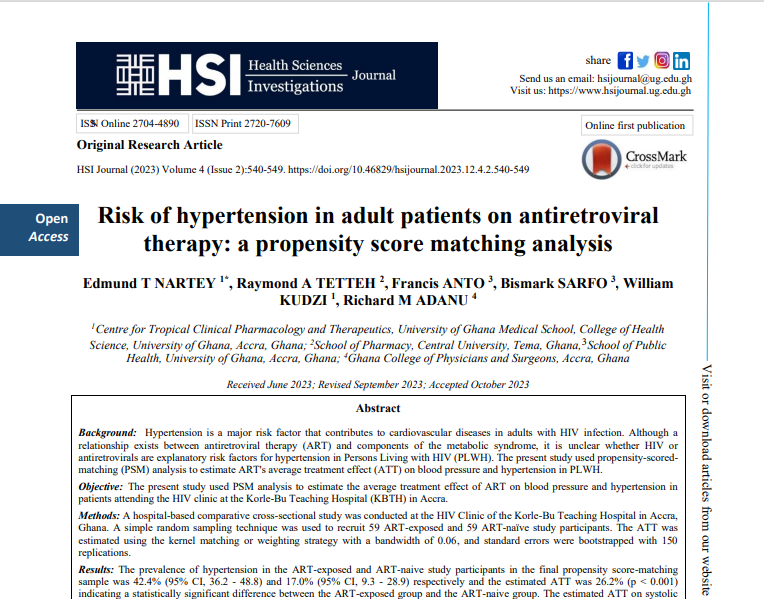Risk of hypertension in adult patients on antiretroviral therapy: a propensity score matching analysis
Risk of hypertension in adult patients on anti-retroviral therapy
Abstract
Background: Hypertension is a major risk factor that contributes to cardiovascular diseases in adults with HIV infection. Although a relationship exists between antiretroviral therapy (ART) and components of the metabolic syndrome, it is unclear whether HIV or antiretrovirals are explanatory risk factors for hypertension in Persons Living with HIV (PLWH). The present study used propensity-scoredmatching (PSM) analysis to estimate ART's average treatment effect (ATT) on blood pressure and hypertension in PLWH.
Objective: The present study used PSM analysis to estimate the average treatment effect of ART on blood pressure and hypertension in patients attending the HIV clinic at the Korle-Bu Teaching Hospital (KBTH) in Accra.
Methods: A hospital-based comparative cross-sectional study was conducted at the HIV Clinic of the Korle-Bu Teaching Hospital in Accra, Ghana. A simple random sampling technique was used to recruit 59 ART-exposed and 59 ART-naïve study participants. The ATT was estimated using the kernel matching or weighting strategy with a bandwidth of 0.06, and standard errors were bootstrapped with 150 replications.
Results: The prevalence of hypertension in the ART-exposed and ART-naive study participants in the final propensity score-matching sample was 42.4% (95% CI, 36.2 - 48.8) and 17.0% (95% CI, 9.3 - 28.9) respectively and the estimated ATT was 26.2% (p < 0.001) indicating a statistically significant difference between the ART-exposed group and the ART-naive group. The estimated ATT on systolic blood pressure was 12.0 mmHg (95% CI, 5.7 - 18.3; p < 0.001) and that on diastolic blood pressure was 6.1 mmHg (95% CI, 1.3 - 10.8; p = 0.012)
Conclusion: A plausible causal link is reported between ART and hypertension. Significant ATT of ART suggests increases in blood pressure values represent a transition from association to causation. This transition could be a significant step in policy formulation in taking preventive action against hypertension and its complications among PLWH.


